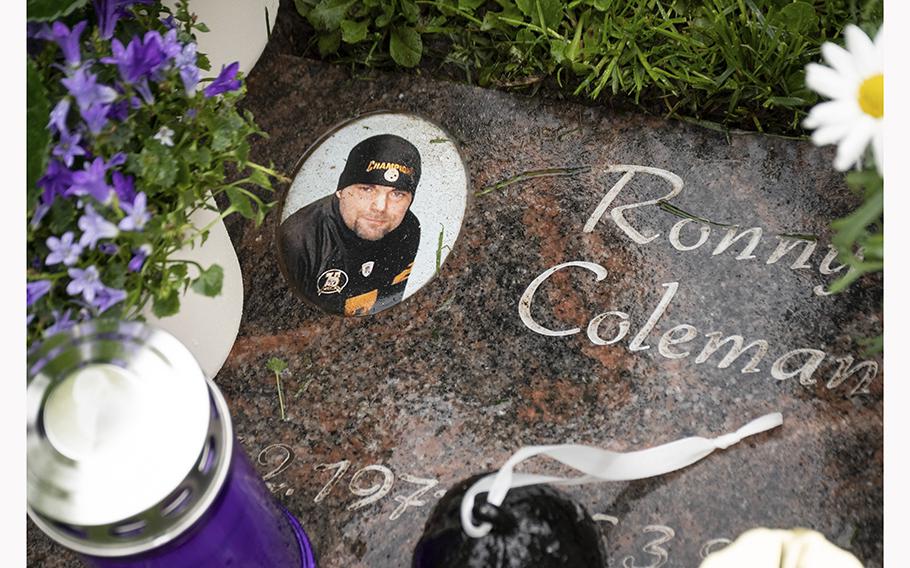
Ronny Coleman’s headstone, paid for with donations made by those at Kleber Kaserne in Kaiserslautern, Germany, was unveiled at a ceremony at a nearby cemetery on Friday, April 28, 2023. (Phillip Walter Wellman/Stars and Stripes)
KAISERSLAUTERN, Germany — Many people who’ve worked in recent years at Kleber Kaserne, a small U.S. Army base in southwestern Germany, can attest to former shoppette worker Ronny Manfred Coleman’s affability.
Stories abound of him discussing football with customers, dancing with them to songs he played during his shift and even lending them his own money when they were a bit short.
But when Coleman, a shift supervisor, died of throat cancer in March 2022 without any close family, he was laid to rest in an unmarked grave in the Kaiserslautern cemetery across the street from the base. His burial plot remained without a headstone for about a year.
That’s no longer the case, thanks to scores of his friends in the Kleber community, who donated roughly $2,000 to ensure that Coleman wouldn’t be forgotten.
A gravestone with his photograph embedded in it was unveiled Friday during a memorial ceremony at the cemetery. The cost was paid by about 100 soldiers and Defense Department civilian employees who work at the installation.
A handful of the donors attended the ceremony under heavy rain, while a bagpiper’s plaintive notes echoed through the air.
“Our purpose was to support one of us,” said Flossie Adams, who worked with Coleman for about a decade at the shoppette operated by the Army and Air Force Exchange Service. “We’re all from different places, but right now, we’re all Kleber family. Ronny, we did it for you.”
Born in 1971 to an American father who served in the military and a German mother, Coleman grew up in Germany and spent most of his life in the country.
After working at the Kleber shoppette for about 15 years, he was diagnosed with throat cancer in 2021, mistaking it at first for COVID-19. On March 25, 2022, he died at the age of 51.
Adams was unable to locate any of Coleman’s family after his death. His only known relative, his mother, lives in a nursing home with dementia and has no memory of her son, Adams said.
Given those circumstances, Adams agreed to pay the cost of his cremation and burial.
“Ronny was more important to me than money,” Adams said. “He had no one else. And he deserves to be respected and remembered.”
To help with the remembrance, Adams began asking customers if they’d be willing to chip in to buy a headstone for Coleman. She said it was only a matter of weeks before enough money was collected.
It took several months to make the grave marker, which features a photo of Coleman wearing a hat and jersey of his favorite NFL team, the Pittsburgh Steelers. Customers often associated him with his Steeler attire.
Others, like Al Green, a marketing representative for Stars and Stripes, whose European bureau is located on the base, have their memories of Coleman rooted in music.
“I would go into the shoppette and he would have all these old school songs playing, and sometimes we would stand there and just dance,” Green said.
In particular, he recalled the sounds of “We are Family” by Sister Sledge.
Janis Spear, an employee of the Defense Logistics Agency at Kleber, said she knew Coleman for about a decade and especially looked forward to seeing him on the weekends.
“I was always bummed out because I had to come in on the weekends, but he would always pick me up,” Spear said. “He wanted to make everyone happy, and I looked forward to seeing him.”
Coleman’s grave is only a few hundred yards from the main entrance of the cemetery, which will allow those working at Kleber to easily visit it during their lunch breaks or after work.
Mike Gosling, another DLA employee, said Coleman’s absence highlights the effect he had on people while he was alive.
“You’d go into the shoppette to buy something, but the impression he left on you could last the rest of the day,” Gosling said.